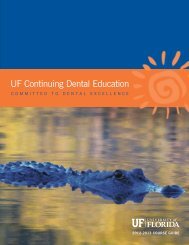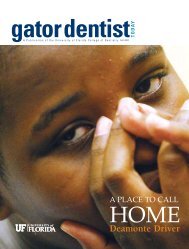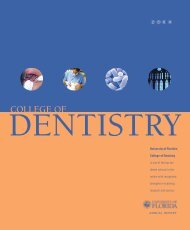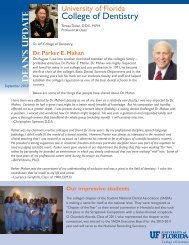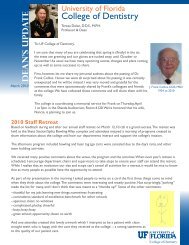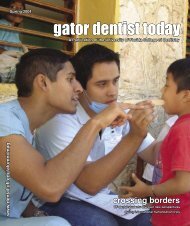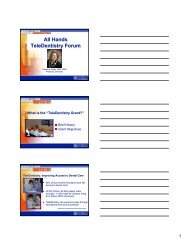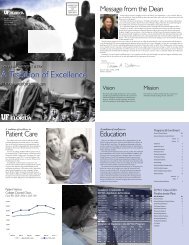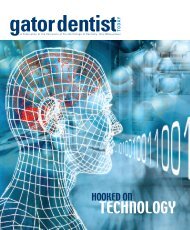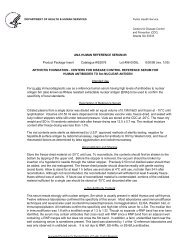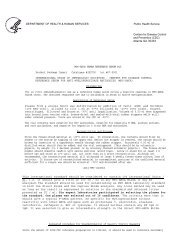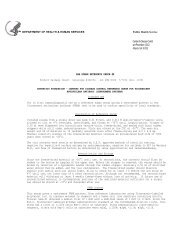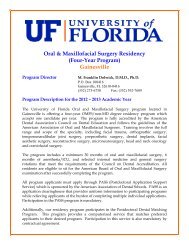Download - College of Dentistry - University of Florida
Download - College of Dentistry - University of Florida
Download - College of Dentistry - University of Florida
You also want an ePaper? Increase the reach of your titles
YUMPU automatically turns print PDFs into web optimized ePapers that Google loves.
espect. Students within the system receive the benefits <strong>of</strong> the academic pursuit <strong>of</strong> knowledge, free<br />
from the obstacles <strong>of</strong> lying, cheating, and stealing. In return, the Academic Honesty Guidelines<br />
demand that students act with integrity in all <strong>of</strong> their endeavors. Exhibiting honesty in academic<br />
pursuits and reporting violations <strong>of</strong> the Academic Honesty Guidelines will encourage others to also act<br />
with integrity. Every student who approaches their studies with honesty and forthrightness suffers<br />
when another student attains an unfair advantage by cheating.<br />
An academic honesty <strong>of</strong>fense is defined as the act <strong>of</strong> lying, cheating, or stealing academic information so<br />
that one gains academic advantage. As a <strong>University</strong> <strong>of</strong> <strong>Florida</strong> student, one is expected to neither commit<br />
nor assist another in committing an academic honesty violation. Additionally, it is the student's duty to<br />
report observed academic honesty violations.<br />
Academic Honesty Guidelines<br />
Students are prohibited from engaging in the following conduct:<br />
Conduct Constituting Academic Dishonesty. A student shall not engage in conduct which constitutes<br />
academic dishonesty. A student commits academic dishonesty by engaging in conduct prohibited by<br />
this subsection. By engaging in such conduct, a student violates the Honor Code and becomes subject<br />
to the Student Conduct & Honor Code<br />
Plagiarism. A student shall not represent as the student's own work all or any portion <strong>of</strong> the work <strong>of</strong><br />
another. Plagiarism includes but is not limited to:<br />
a) Quoting oral or written materials including but not limited to those found on the internet, whether<br />
published or unpublished, without proper attribution.<br />
b) Submitting a document or assignment which in whole or in part is identical or substantially<br />
identical to a document or assignment not authored by the student.<br />
Unauthorized Use <strong>of</strong> Materials or Resources ("Cheating"). A student shall not use unauthorized<br />
materials or resources in an academic activity. Unauthorized materials or resources shall include:<br />
a) Any paper or project authored by the student and presented by the student for the satisfaction <strong>of</strong><br />
any academic requirement if the student previously submitted substantially the same paper or<br />
project to satisfy an academic requirement and did not receive express authorization to resubmit<br />
the paper or project.<br />
b) Any materials or resources prepared by another student and used without the other student's<br />
express consent or without proper attribution to the other student.<br />
c) Any materials or resources which the faculty member has notified the student or the class are<br />
prohibited.<br />
d) Use <strong>of</strong> a cheat sheet when not authorized to do so or use <strong>of</strong> any other resources or materials during<br />
an examination, quiz, or other academic activity without the express permission <strong>of</strong> the faculty<br />
member, whether access to such resource or materials is through a cell phone, PDA, other electronic<br />
device, or any other means.<br />
Prohibited Collaboration or Consultation. A student shall not collaborate or consult with another<br />
person on any academic activity unless the student has the express authorization from the faculty<br />
member.<br />
a) Prohibited collaboration or consultation shall include but is not limited to:<br />
1. Collaborating when not authorized to do so on an examination, take-home test, writing project,<br />
assignment, or course work.<br />
2. Collaborating or consulting in any other academic or co-curricular activity after receiving notice<br />
that such conduct is prohibited.<br />
3. Looking at another student's examination or quiz during the time an examination or quiz is<br />
given. Communication by any means during that time, including but not limited to<br />
29



